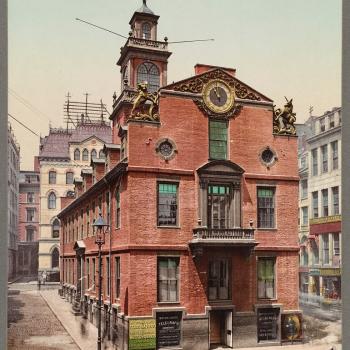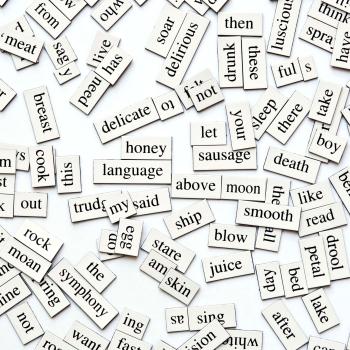Students explore letter poems and experiment with writing letters as poems, using the placement of line breaks to enhance rhythm, sound, meaning, and appearance.

Letter Poems Deliver: Experimenting with Line Breaks in Poetry Writing

Grades
|
Writing a Flashback and Flash-Forward Story Using Movies and Texts as Models
6 - 8
Lesson Plan
| Standard Lesson
Using the film The Sandlot, students are introduced to the literary devices of flashbacks and flash-forwards. They then write their own stories using those devices.

Grades
|
How Big Are Martin's Big Words? Thinking Big about the Future
3 - 5
Lesson Plan
| Minilesson
Inspired by the book Martin's Big Words, students explore information on Dr. King to think about his "big" words, then they write about their own "big" words and dreams.

Grades
|
What Makes Poetry? Exploring Line Breaks
3 - 5
Lesson Plan
| Minilesson
Students read various poems and explore why lines are broken where they are and how they affect rhythm, sound, meaning, and appearance in poetry.

Grades
|
It Doesn't Have to End That Way: Using Prediction Strategies with Literature
K - 2
Lesson Plan
| Minilesson
After listening to the beginning of a story, students use details in the text, personal experience, and prior knowledge to predict the way the story will end.

Grades
|
Breaking Barriers, Building Bridges: Critical Discussion of Social Issues
6 - 8
Lesson Plan
| Standard Lesson
Through a series of picture book read-alouds, students engage in critical discussion of complex issues of race, class, and gender.

Grades
|
Who's Got Mail? Using Literature to Promote Authentic Letter Writing
3 - 5
Lesson Plan
| Standard Lesson
Students discuss and chart letter elements and write their own letters to adults at school, reinforcing letter-writing skills beyond the classroom lesson.

Grades
|
Growing Readers and Writers with Help from Mother Goose
K
Lesson Plan
| Recurring Lesson
Watch Mother Goose work her magic! This lesson uses nursery rhymes to help emergent readers remember the letters and their sounds and identify word chunks.

Grades
|
Family Message Journals Teach Many Purposes for Writing
K - 2
Lesson Plan
| Standard Lesson
This lesson encourages children to explore authentic reasons for writing by writing messages to their family in a family message journal.

Grades
|
Alliteration in Headline Poems
6 - 8
Lesson Plan
| Minilesson
Students will be introduced to the term alliteration and create a headline poem consisting of 25 words that contain at least three examples of alliteration.

Grades
|
She Did What? Revising for Connotation
6 - 8
Lesson Plan
| Minilesson
Did she walk, skip, amble, dance? In this minilesson, students explore connotation by acting out and revising the simple sentence "She walked into the room."

Grades
|
Launching Family Message Journals
K - 2
Lesson Plan
| Standard Lesson
This lesson introduces Family Message Journalsa teacher-tested tool for encouraging family involvement and supporting writing to reflect and to learn.

Grades
|
Avalanche, Aztek, or Bravada? A Connotation Minilesson
6 - 8
Lesson Plan
| Minilesson
Students examine familiar car names for underlying connotations then proceed through a series of steps, increasing their control over language, until they select words with powerful connotations in their own writing.

Grades
|
Graphic Life Map
6 - 8
Lesson Plan
| Standard Lesson
In this autobiographical prewriting activity, students brainstorm important memories, choose graphics to represent these memories, and then rank the events as low or high points in their lives.

Grades
|
Writing Reports in Kindergarten? Yes!
K
Lesson Plan
| Unit
This lesson encourages young students to see themselves as writers with a message to convey. Three types of reports are provided to show what kindergartners and emergent writers can do.

Grades
|
Using Repetition and Picture Cues to Foster Independent Young Readers
K
Lesson Plan
| Minilesson
Kindergartners share their knowledge of letters and sounds in a large group setting, giving teachers an assessment opportunity. Each student contributes a page to make a repetitive classroom book.

Grades
|
BioBags: Linking Literature and Life
3 - 5
Lesson Plan
| Standard Lesson
Students create BioBags, a collection of texts that mark special times in their lives. BioBags provide a way for students to share a variety of events and texts.

Grades
|
Blogging With Photovoice: Sharing Pictures in an Integrated Classroom
9 - 12
Lesson Plan
| Standard Lesson
Make the most of your students' diverse ability levels and experience with a prewriting activity in which they describe an abstract idea using blogging and photographs that they have taken.

Grades
|
Using Pictures to Build Schema for Social Studies Content
3 - 5
Lesson Plan
| Standard Lesson
How do you read an image? Students find out in this lesson in which they "read" several images of the Boston Massacre to better understand the event and recognize effects of propaganda.

Grades
|
The Magnetism of Language: Parts of Speech, Poetry, and Word Play
6 - 8
Lesson Plan
| Standard Lesson
What wonderful ways words work! The parts of speech are the highlight of this lesson in which students identify parts of speech in a nonsensical poem and then create their own wild and wacky rhymes.